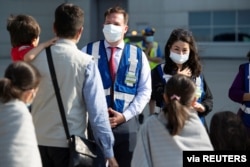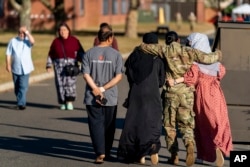The government of Canada says it is determined to reach its target of admitting at least 40,000 Afghan refugees by the end of the year.
More than 30,600 Afghans have been resettled in Canada since August 2021 when Ottawa announced it would admit thousands of Afghans whose lives could be at risk under the new Taliban regime.
Canada "is firm in its commitment to resettle at least 40,000 Afghan nationals by the end of 2023, which remains one of the largest programs in the world," a spokesperson for Immigration, Refugees and Citizenship Canada (IRCC) told VOA.
Among those resettled, over 10,000 are individuals who worked for Canadian agencies and programs in Afghanistan while more than 16,000, particularly women and civil society activists, have been admitted under humanitarian considerations.
More than 18,000 applications are still under review by Canadian and international nongovernment organizations and the U.N. Refugee Agency (UNHCR) for resettlement in the next several months.
Resettlement operations are executed via chartered and commercial flights from Afghanistan and third-party countries.
"The current situation is complex and the challenges are extraordinary," the spokesperson said. "How quickly any Afghan arrives in Canada once their application is approved depends on a variety of factors, many of which are beyond our control, and often directly relate to where Afghans are located.
"There are significant challenges chartering flights in some regions and each country sets its own entry and exit requirements and determines when and if these requirements are changed," the spokesperson said.
While Canada has no diplomatic presence in Afghanistan, a network of Canadian visa officers across the world are tasked with processing applications expeditiously to achieve the target by the end of the year.
Canada's government allocated more than $80 million to fund its Afghan program in the 2022-2023 financial year, according to IRCC, which has a total annual budget of nearly $3 billion, a portion of which is also used to support various resettlement programs.
Women
Half of the Afghan refugees taken by Canada are women who are admitted primarily because of the Taliban's systemic denial of basic rights for women.
Human rights groups say Afghanistan is suffering a gender apartheid under the hardline Islamist regime.
Women leaders, religious and ethnic minorities, journalists and LGBTI individuals are prioritized under Canada's humanitarian resettlement program, which only accepts applicants referred by UNHCR and two European human rights organizations.
"It would actually be helpful if it was just women generally," Lauryn Oates, executive director of a nongovernmental organization Canadian Women for Women in Afghanistan, told VOA.
"All women are at risk in Afghanistan," Oates said, adding that Canada and other countries that admit Afghan refugees should accept women "on the basis of gender alone."
The United States and European countries have also taken tens of thousands of Afghan refugees over the past 20 months.
In the immediate aftermath of the Taliban's return to power, the U.S. military evacuated more than 124,000 individuals from Afghanistan. More than 77,000 of those evacuees were admitted into the United States for urgent humanitarian reasons and offered a two-year entry parole, according to the Department of Homeland Security (DHS).
A DHS spokesperson did not answer questions about the gender-based breakdown of the Afghans given paroled entry into the United States.
"For the average Afghan woman, there are no pathways to resettle to the U.S.," Devon Cone, a women's rights advocate at Refugees International, told VOA.
Cone said the U.S. Department of State's P-1 and P-2 resettlement programs for Afghans do not specifically target women.
Managed through the U.S. Refugees Admission Program, the P-1 offers resettlement pathways for any individual of any nationality with compelling protection needs, while the P-2 program is for "qualified Afghans" who worked for U.S. agencies in Afghanistan.
"Even though these P-1 and P-2 programs exist, they are not really functioning, especially in places like Pakistan," said Cone. "There are very few options for Afghan women at risk to resettle to the U.S. and the options that do exist are not working."
Addressing a House of Representatives Appropriations subcommittee in March, U.S. Secretary of State Antony Blinken said he is "personally committed to keeping our promises to those who stood by us in Afghanistan."
"The efficient processing and ultimate resettlement of these individuals continues apace and remains among the administration's highest priorities," a State Department spokesperson said.
VOA immigration reporter Aline Barros contributed to this report.







